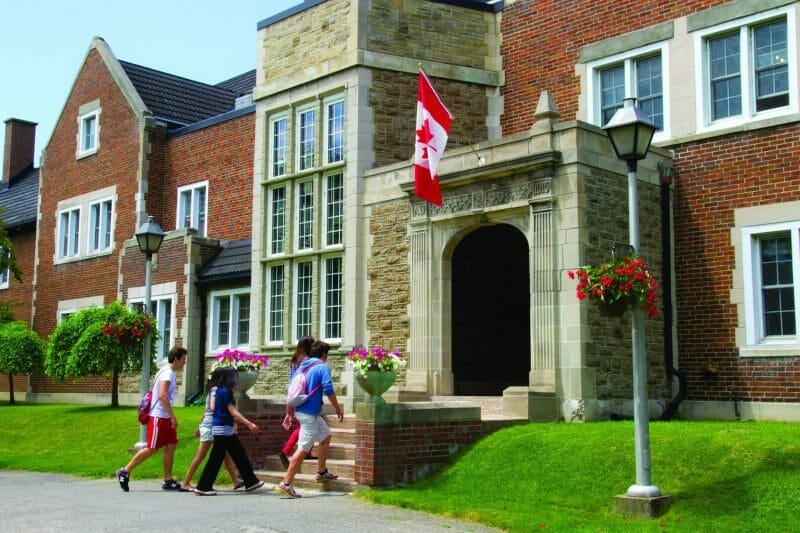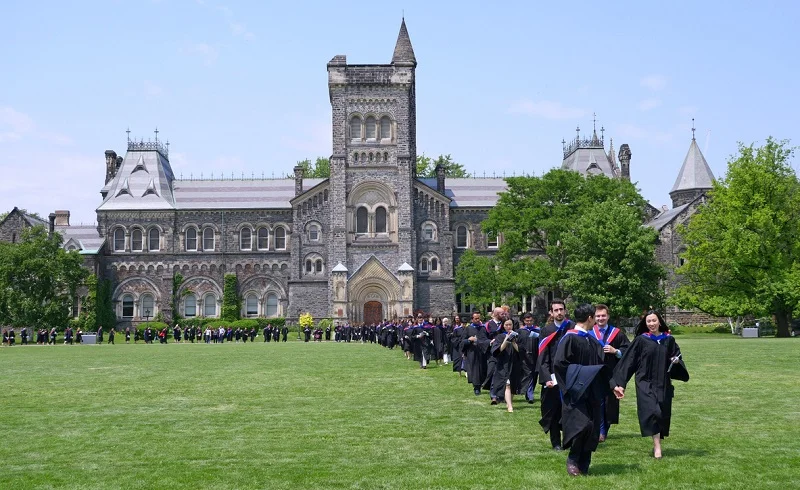Bridging the Skills Gap: How Canadian Colleges Are Adapting to the Future Job Market in 2025

In 2025, Canadian colleges are adapting to the future job market by reimagining education to meet the demands of a rapidly evolving economy.
The world of work is shifting—driven by automation, artificial intelligence (AI), and the rise of green and digital economies.
Colleges across Canada are stepping up, not just as institutions of learning but as catalysts for workforce readiness, equipping students with skills that align with emerging industries.
This transformation is critical: how can we prepare a generation for jobs that don’t yet exist while addressing immediate employer needs?
This article explores how Canadian colleges are bridging the skills gap through innovative programs, partnerships, and forward-thinking strategies, ensuring graduates thrive in 2025’s dynamic job landscape.
As the job market evolves, the role of education becomes increasingly vital in shaping a workforce capable of meeting future challenges.
Colleges are not only responding to current trends but also anticipating the skills that will be necessary in the years to come.
The Evolving Job Market: A New Reality for Canadian Workers
The Canadian job market is undergoing a seismic shift.
Automation is reshaping industries, with 42% of Canadian jobs at high risk of being affected by automation, according to a 2016 Brookfield Institute report.
While this statistic highlights the urgency, it’s not just about replacing workers with machines—it’s about redefining roles.
Employers now seek candidates with hybrid skills: technical expertise paired with creativity, critical thinking, and adaptability.
For instance, a software developer today might need data analytics proficiency alongside emotional intelligence to collaborate effectively in diverse teams.
Canadian colleges are adapting to the future job market by rethinking curricula to prioritize these hybrid competencies.
Unlike universities, which often focus on theoretical knowledge, colleges emphasize practical, hands-on training tailored to industry needs.
This agility allows them to respond swiftly to market trends, whether it’s the rise of renewable energy or the demand for cybersecurity experts.
By aligning programs with real-world demands, colleges are not just preparing students for jobs—they’re future-proofing careers.
Moreover, the integration of soft skills into technical training is becoming essential.
As industries evolve, the ability to communicate, collaborate, and innovate will set candidates apart in competitive job markets.
Curriculum Innovation: Blending Hard and Soft Skills
Imagine a bridge connecting today’s classrooms to tomorrow’s workplaces.
Canadian colleges are building that bridge by embedding both technical and interpersonal skills into their programs.
Take Seneca College in Ontario, for example.
In 2025, its revamped Data Analytics program integrates machine learning basics with courses on ethical decision-making and communication.
This ensures graduates can not only crunch numbers but also explain insights to non-technical stakeholders—a skill employers increasingly value.
Colleges are also embracing micro-credentials, short, targeted courses that allow students to upskill quickly.
These programs, often developed with industry input, focus on specific skills like cloud computing or sustainable supply chain management.
For instance, British Columbia’s Okanagan College offers a micro-credential in Green Construction Techniques, addressing the growing need for eco-conscious building practices.
By offering flexible, stackable credentials, colleges enable learners to adapt to shifting job requirements without committing to lengthy degrees.
| Program Type | Focus Area | Example College | Key Skill Developed |
|---|---|---|---|
| Micro-Credential | Green Construction | Okanagan College | Sustainable Building Practices |
| Diploma | Cybersecurity | Humber College | Network Security & Ethics |
This approach reflects a broader trend: Canadian colleges are adapting to the future job market by prioritizing flexibility.
They’re moving away from rigid, one-size-fits-all degrees toward modular education that evolves with industry needs.
This shift empowers students to pivot careers as new opportunities emerge, from AI-driven healthcare to renewable energy innovation.
Furthermore, the emphasis on lifelong learning ensures that education remains relevant throughout a person’s career.
As industries change, so too must the skills and knowledge of the workforce.
+ New Student Loan Rules: What Graduates Need to Know Before Summer
Industry Partnerships: Closing the Gap Through Collaboration
Collaboration is the heartbeat of innovation in Canadian colleges.
Recognizing that no institution can anticipate every industry shift alone, colleges are forging partnerships with employers to co-create programs.
For example, Conestoga College in Ontario collaborates with local tech firms to design its Software Engineering Technology program.
Students work on real-world projects, such as developing apps for small businesses, gaining practical experience while meeting employer expectations.
These partnerships extend beyond tech.
In Alberta, Bow Valley College works with energy companies to train students in renewable energy systems, addressing Canada’s push toward net-zero goals.
By involving industry leaders in curriculum design, colleges ensure graduates possess skills that match current and future job demands.
This collaborative model also opens doors to internships and job placements, creating a direct pipeline from classroom to career.
| College | Industry Partner | Program Focus | Outcome |
|---|---|---|---|
| Conestoga College | Local Tech Firms | Software Engineering | Real-world app development |
| Bow Valley College | Energy Companies | Renewable Energy Systems | Job-ready renewable tech skills |
Such partnerships highlight a key strength: Canadian colleges are adapting to the future job market by grounding education in real-world applications.
This isn’t just about teaching skills—it’s about ensuring those skills translate into employment.
In addition, these collaborations foster innovation by allowing students to engage with cutting-edge technologies and practices.
As a result, graduates emerge not only with knowledge but also with the experience needed to excel in their fields.

Technology as a Catalyst: Embracing AI and Digital Tools
The rise of AI isn’t just transforming jobs; it’s reshaping how colleges teach.
In 2025, Canadian colleges are integrating AI-driven tools to enhance learning and prepare students for tech-centric workplaces.
For instance, Centennial College in Toronto uses AI-powered simulations in its Advanced Manufacturing program, allowing students to practice operating automated systems in a virtual factory.
This hands-on approach mirrors the environments graduates will encounter in Industry 4.0 settings.
Beyond teaching technical skills, colleges are embedding digital literacy across disciplines.
A marketing student at Nova Scotia Community College, for example, learns to use AI tools for consumer behavior analysis, blending creativity with data-driven decision-making.
By embedding technology in education, Canadian colleges are adapting to the future job market, ensuring graduates are fluent in the tools shaping their industries.
This embrace of technology extends to pedagogy.
Virtual reality (VR) labs allow students to simulate complex tasks, from surgical procedures to wind turbine repairs, without real-world risks.
These innovations make learning immersive and relevant, preparing students for jobs that demand tech fluency.
Furthermore, integrating AI into administrative processes helps colleges streamline operations, allowing more focus on student engagement and learning outcomes.
As a result, educational institutions can respond more effectively to the changing needs of students and employers alike.
Addressing Regional Needs: A Localized Approach
Canada’s diverse economy demands tailored solutions.
Colleges in different regions are adapting to local job markets while keeping an eye on global trends.
In Atlantic Canada, where the ocean economy is booming, the College of the North Atlantic offers programs in Marine Technology, training students for roles in sustainable fisheries and offshore wind energy.
Meanwhile, in urban centers like Vancouver, Langara College focuses on fintech and digital marketing, reflecting the city’s tech-driven economy.
This localized approach ensures Canadian colleges are adapting to the future job market in ways that resonate with regional employers.
By addressing specific workforce gaps—whether it’s healthcare in rural Manitoba or green tech in British Columbia—colleges make education relevant and impactful.
Moreover, this strategy fosters a sense of community and responsibility among students, encouraging them to contribute to local economies.
As graduates engage with their communities, they help drive innovation and growth in their respective regions.
++ São Paulo Government Sends 112 Students to Canada and New Zealand
Equity and Inclusion: Preparing a Diverse Workforce
The future job market demands diversity, and Canadian colleges are leading the charge.
Recognizing that underrepresented groups often face barriers to education and employment, colleges are implementing inclusive programs.
For example, George Brown College in Toronto offers scholarships and mentorship for Indigenous students pursuing STEM fields, addressing both equity and industry demand for diverse talent.
Colleges are also embedding cultural competency training to prepare students for globalized workplaces.
This ensures graduates can navigate diverse teams and markets, a critical skill as Canadian businesses expand internationally.
By prioritizing inclusion, Canadian colleges are adapting to the future job market, creating opportunities for all while meeting employer needs for diverse perspectives.
Additionally, fostering an inclusive environment enriches the educational experience for all students.
As they learn alongside peers from various backgrounds, students develop empathy and collaboration skills that are essential in the modern workforce.

The Role of Lifelong Learning: Adapting to Change
The concept of a single, lifelong career is fading.
In 2025, Canadian colleges are championing lifelong learning to help workers adapt to constant change.
Continuing education programs, like those at Algonquin College in Ottawa, offer evening and online courses in areas like blockchain and sustainable agriculture.
These programs cater to mid-career professionals seeking to upskill without pausing their careers.
This focus on lifelong learning reflects a broader truth: Canadian colleges are adapting to the future job market by fostering resilience.
They’re teaching students not just what to learn, but how to learn, ensuring they can pivot as industries evolve.
This adaptability is crucial in a world where new technologies emerge faster than traditional education can keep up.
Moreover, creating pathways for lifelong learning encourages a culture of continuous improvement among graduates.
As they pursue additional skills and knowledge, they remain competitive and relevant in their fields.
Challenges and Opportunities: Navigating the Transition
Despite their progress, colleges face challenges.
Funding constraints can limit investments in cutting-edge technology or faculty training.
Additionally, aligning curricula with rapidly changing industries requires constant vigilance.
Yet these challenges are also opportunities.
By leveraging government grants and private partnerships, colleges can access resources to innovate further.
For instance, federal initiatives like Canada’s Future Skills Centre provide funding for skills-focused programs, enabling colleges to experiment with new models.
The opportunity lies in agility.
Unlike larger institutions, colleges can pivot quickly, testing new programs and scaling successful ones.
This nimbleness positions Canadian colleges as leaders in workforce development, capable of bridging the skills gap in ways universities often cannot.
Furthermore, by embracing a culture of innovation, colleges can continuously improve their offerings and remain relevant in a fast-changing job market.
This proactive approach ensures that they meet the needs of students and employers alike.
To learn more about the initiatives being implemented in Canadian colleges, visit the Government of Canada’s official site here.
A Call to Action: Why This Matters Now
Why should students, educators, and employers care about these changes?
Because the future is now.
Canadian colleges are adapting to the future job market by building bridges between education and employment, ensuring graduates are not just job-ready but future-ready.
From AI-driven learning to industry partnerships, colleges are redefining what it means to prepare for work in 2025.
For students, this means access to education that’s relevant, flexible, and inclusive.
For employers, it’s a pipeline of skilled talent ready to tackle tomorrow’s challenges.
And for Canada, it’s a stronger, more resilient economy.
As colleges continue to innovate, they’re not just closing the skills gap—they’re shaping the future of work.
By investing in education and adapting to the changing landscape, we can build a workforce that thrives in the face of uncertainty.
